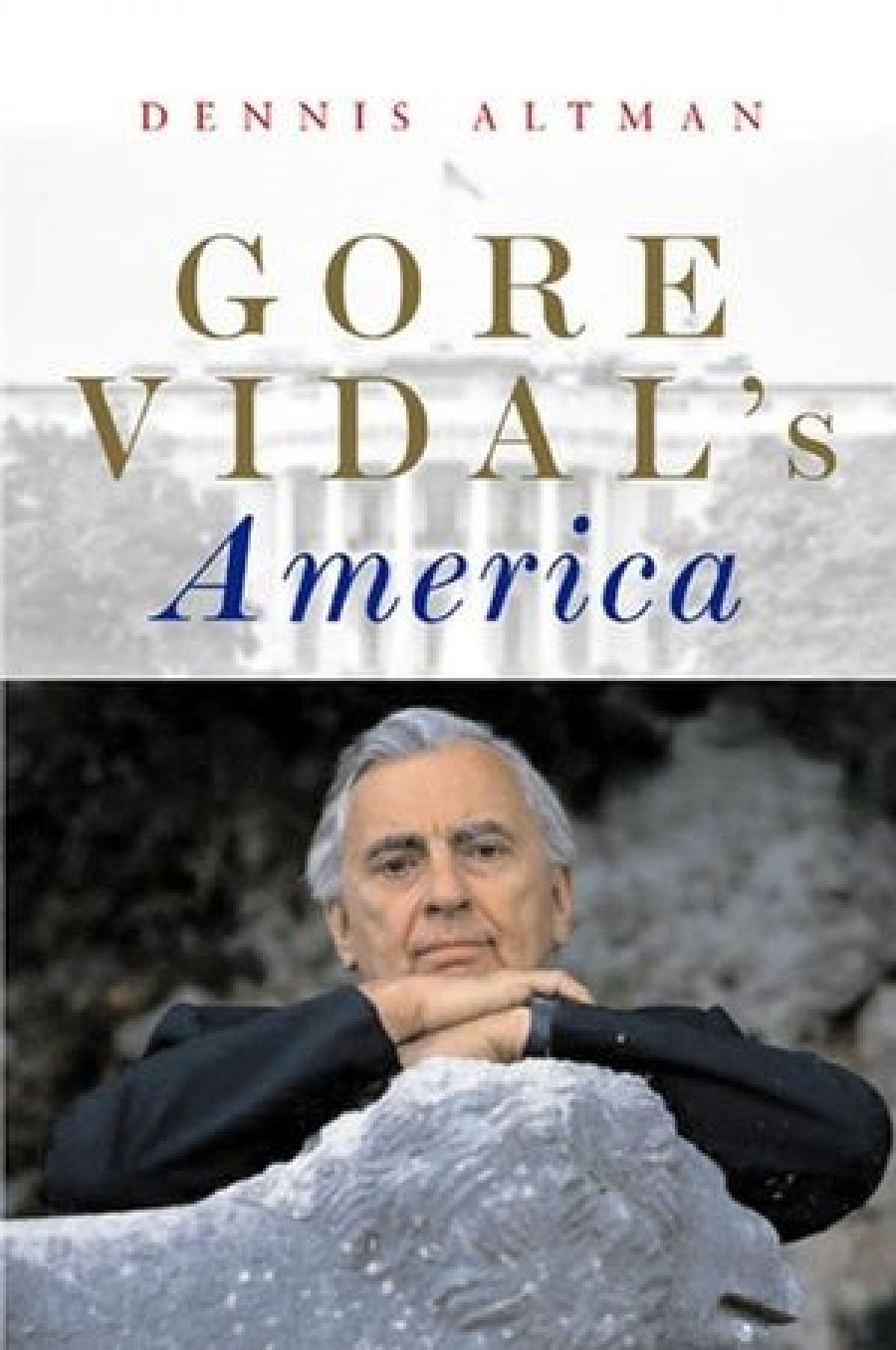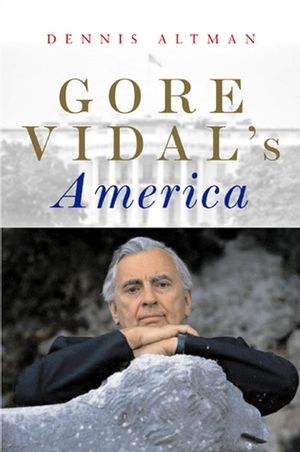
- Free Article: No
- Contents Category: Literary Studies
- Review Article: Yes
- Article Title: A less common form of malady
- Online Only: No
- Custom Highlight Text:
The editors of Conversations with Gore Vidal – a recently published selection of interviews conducted with Vidal over the course of his long career – introduce the volume by quoting a comment made in the New Yorker in 1960: ‘Nothing’s easier nowadays than to get the feeling of being surrounded by Gore Vidal.’ They go on to remark that, today: ‘Gore Vidal is again seemingly everywhere.’ Although this is something of an exaggeration, it is true that Vidal and his diverse oeuvre appear to have received more serious attention in the past few years than previously. Now eighty years old, this unique and often controversial figure in American culture has lived long enough to see accepted into the mainstream several of his ideas once regarded as outrageous or ‘unpatriotic’. Indeed, as a Publisher’s Weekly reviewer, quoted by Altman, remarked in 2004: ‘Vidal may be in tune with the zeitgeist again …’
- Book 1 Title: Gore Vidal’s America
- Book 1 Biblio: Polity Press, $41.95 pb, 216 pp
- Book 1 Cover Small (400 x 600):

- Book 1 Cover (800 x 1200):

Gore Vidal’s America is a useful and very readable addition to the growing body of scholarship on Vidal, cleverly pitched to appeal to those either familiar or unfamiliar with Vidal’s own writing. Jay Parini, Vidal’s literary executor, has praised Gore Vidal’s America as ‘the finest work yet published on Gore Vidal’, a judgment with which it would be difficult to argue. A careful reader of all of Vidal’s works and those of his important contemporaries, Altman brings the perspective of a political scientist to bear upon them, and it is that perspective which gives this book both a freshness and a depth sometimes lacking in the orthodox literary criticism on Vidal. Providing a broad context against which Vidal’s unusual status within American letters can be assessed, Altman explores the ways in which significant social and political events in the US formed and informed Vidal – and the extent to which he in turn has influenced American politics and society.
Judiciously avoiding a conventional chronological approach, Altman has structured the book in ten parts – an introduction and nine chapters – each focused mainly upon one aspect of Vidal’s life and work. Vidal was born into privilege – his father being a significant player in the start of the commercial aviation industry, and his maternal grandfather the first senator from Oklahoma – but has almost always taken an oppositional stance in relation to the politics and mores of his country. Until recently, he lived for half of each year in Italy, this being one of the factors that has led to accusations by insular compatriots that he hates the US. He has written prolifically in a variety of forms. There are now twenty-four novels, not including the early books published under pseudonyms. Although his novels and essays are widely read, he is probably better known in the US from his lectures and television appearances. (He has also established a late minor career as a film actor: in this country, young people who have never read him often recognise him as the villain in the science-fiction film Gattaca.) He is proud of having enlisted in the army during World War II (‘That’s what we did in those days; we did not go off to the Texas Air Force and hide’); however, he has consistently deplored the eagerness of American leaders to go to war, culminating in his vociferous criticism of the foreign policies of the current administration.
Having written a successful war novel at the age of nineteen, Vidal took a calculated gamble three years later with his third novel, The City and the Pillar (1948), which depicted an ordinary middle-class American boy who happened to be in love with another ordinary middle-class American boy. In his chapter entitled ‘Sex’, Altman primarily discusses the enormous impact of The City and the Pillar and Myra Breckinridge (1968). As Altman indicates, perceptions of Vidal amongst gay writers and activists vary, his eschewing of such categories as ‘heterosexual’, ‘bisexual’ or ‘homosexual’, in relation to himself or others, being regarded by some as unhelpful evasion, but by others as canny defiance.
Between 1954 and 1964, after producing his first eight novels, Vidal wrote plays for television, at which he was financially and critically very successful. Though less well known as a playwright than as a novelist or essayist, he has had several hits on Broadway, not least The Best Man (1960), which depicted a presidential campaign. Altman raises the ‘standard clichés’ – that Vidal is not a first-class writer and that he is a better essayist than a novelist – in order, refreshingly, to refute them. Although he rates some of Vidal’s ‘inventions’, the satirical fantasies, more highly than I do, Altman asserts that: ‘It is the historical saga that is likely to remain Vidal’s greatest contribution to American literature.’ Sometimes collectively entitled ‘Narratives of a Golden Age’ and sometimes ‘Narratives of Empire’, this saga consists of seven novels, written between 1967 and 2000, which depict the history of the US from the revolutionary war until the 1950s.
Of Vidal’s other novels, the two most important are arguably Julian (1964) and Creation (1982), historical fictions about politics and religion set, respectively, in the fourth century AD and the fifth century BC. In these books as elsewhere, Vidal portrays the perniciousness of monotheism, and in Creation addresses the epic themes of foreign policy and unfinished family business in ways that are eerily pertinent to our understanding of the two Bush administrations. If there is a key message in Vidal’s oeuvre, it is that, without knowledge of the past, neither an individual nor a society can properly comprehend the present or anticipate the future. And yet his works convey a deep scepticism about the reliability of historians and historical record, and about the good faith of those who disseminate religious doctrine.
‘Politics’, the fourth and longest chapter, is the core of Gore Vidal’s America. Through his mother’s second marriage, to the millionaire who would later also become Jacqueline Bouvier’s stepfather, Vidal would become briefly an intimate of John F. Kennedy. He himself ran twice for political office, in 1960 and in 1982. I had feared that Altman’s thirty-year acquaintance with Vidal may have constrained his critique. Fortunately, this fear proved unfounded. Altman provides a balanced discussion of Vidal’s political views, pointing out inconsistencies and gaps in his reasoning, as well as giving credit where it is due. Appropriately, he dwells upon Vidal’s ‘greatest blindness, a failure to grasp the full magnitude of the scars left by race on the United States [by] a double dispossession, that of the original inhabitants and that of the African slaves who were brought to farm the south’, and upon ‘his two consistent themes: the persistence of the American Empire and the centrality of money in controlling government decisions’. Altman also analyses that curious episode in Vidal’s later life – seemingly more in harmony with Norman Mailer’s career than Vidal’s – namely, his correspondence with the Oklahoma bomber, Timothy McVeigh. At his best, Vidal is eminently wise and far-sighted – at other times, the hyperbole of his protestation can backfire. As Altman remarks: ‘When he is not inveighing against the ongoing collapse of American virtue, Vidal is one of the best guides available to how politics actually work, to the constant balance between ambition, ideology, self-interest, and altruism that characterises politicians.’
Gore Vidal’s America was clearly written with the author’s sense that Vidal and Mailer are the last of their kind – the literary writer as celebrity and political commentator – and that they cannot go on forever. Altman at times veers disconcertingly between past and present tenses in discussing the Vidal of the here and now, as if he were already gone. Vidal himself, though, has often sounded the valedictory note. In 1977, in response to an interviewer’s question, he reflected that: ‘Early in life I decided I was the judge. What I thought of people was more important than what they thought of me. I have no desire to be lovable. Wanting to be loved is a common malady. I would like to be useful, a less common form of malady.’ One can only hope that the old master can defy his mortality and stay on a little longer – to continue to judge, to be ‘unlovable’ and to be useful.


Comments powered by CComment